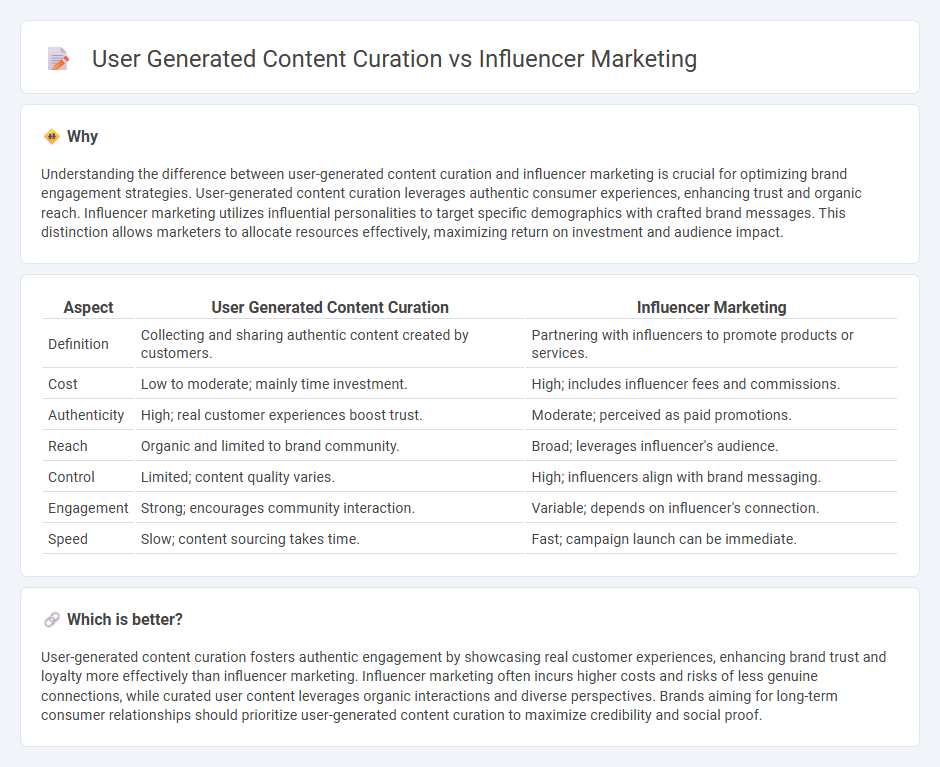
User-generated content curation leverages authentic consumer experiences to build brand trust and enhance engagement, while influencer marketing relies on strategic partnerships with individuals who possess significant audience reach and credibility. Both approaches optimize marketing efforts by harnessing social proof, yet differ in cost, control, and scalability. Discover how to balance these tactics to maximize your brand's digital impact.
Why it is important
Understanding the difference between user-generated content curation and influencer marketing is crucial for optimizing brand engagement strategies. User-generated content curation leverages authentic consumer experiences, enhancing trust and organic reach. Influencer marketing utilizes influential personalities to target specific demographics with crafted brand messages. This distinction allows marketers to allocate resources effectively, maximizing return on investment and audience impact.
Comparison Table
| Aspect | User Generated Content Curation | Influencer Marketing |
|---|---|---|
| Definition | Collecting and sharing authentic content created by customers. | Partnering with influencers to promote products or services. |
| Cost | Low to moderate; mainly time investment. | High; includes influencer fees and commissions. |
| Authenticity | High; real customer experiences boost trust. | Moderate; perceived as paid promotions. |
| Reach | Organic and limited to brand community. | Broad; leverages influencer's audience. |
| Control | Limited; content quality varies. | High; influencers align with brand messaging. |
| Engagement | Strong; encourages community interaction. | Variable; depends on influencer's connection. |
| Speed | Slow; content sourcing takes time. | Fast; campaign launch can be immediate. |
Which is better?
User-generated content curation fosters authentic engagement by showcasing real customer experiences, enhancing brand trust and loyalty more effectively than influencer marketing. Influencer marketing often incurs higher costs and risks of less genuine connections, while curated user content leverages organic interactions and diverse perspectives. Brands aiming for long-term consumer relationships should prioritize user-generated content curation to maximize credibility and social proof.
Connection
User-generated content (UGC) curation amplifies influencer marketing by leveraging authentic brand experiences shared by consumers, which enhances trust and engagement. Influencers often inspire UGC through their endorsements, creating a feedback loop that boosts brand visibility and credibility. Curating this content strategically integrates influencer campaigns with organic customer voices, optimizing marketing impact and ROI.
Key Terms
Endorsement
Influencer marketing leverages the credibility of established personalities to provide authentic endorsements that drive consumer trust and engagement, often resulting in higher brand visibility and conversion rates. User-generated content curation collects and showcases genuine consumer experiences and endorsements, enhancing brand authenticity through peer validation and organic advocacy. Explore how combining influencer endorsements with user-generated content can maximize trust and brand loyalty.
Authenticity
Influencer marketing leverages trusted individuals with established audiences to promote brands, providing authenticity through personal endorsements and storytelling. User-generated content curation collects genuine customer posts and reviews, enhancing brand credibility by showcasing real experiences without polished advertising. Explore how combining these strategies can amplify authenticity and deepen consumer trust in your marketing approach.
Engagement
Influencer marketing drives engagement by leveraging trusted personalities with established audiences, resulting in higher click-through rates and brand awareness. User-generated content curation fosters organic interaction and community involvement through authentic customer stories, increasing social proof and trust. Discover effective strategies to balance both for maximizing engagement in your campaigns.
Source and External Links
Influencer marketing - Influencer marketing is a social media marketing form where brands collaborate with influencers who have expertise and established audiences to endorse products, affecting consumer buying behavior, especially on platforms like Instagram, TikTok, and YouTube.
What Is Influencer Marketing? - This marketing approach involves partnering with individuals who have a following to raise brand exposure, with a strategy centered on setting clear goals, identifying aligned audiences, and budgeting appropriately for campaigns.
Influencer Marketing and Why It's Important Today - Influencer marketing leverages trusted influencers to reach targeted consumers authentically, countering growing brand distrust and adapting to changing media consumption with highly engaged audiences across multiple social platforms.
 dowidth.com
dowidth.com